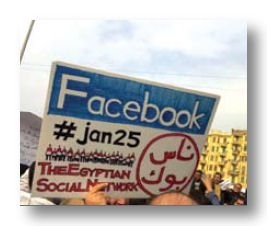
SOCIAL REVOLUTION?
During the Arab Spring, the world lauded the use of social to effect change. Are the revolutions, coups and civil wars that continue to plague the region still making good use of the medium?
Guy Gabriel, senior associate, Albany Associates Ltd
Social media is one of the most proximate tools the Western world has to observe and try to make sense of what is going on in the Middle East. We can access it from our desks wherever we may be in the world, particularly if it is in English. But as a tool it has no special properties; it is a platform. Nothing about it suggests it is better equipped to convey objectivity than anything else.
Social media can catalyse, it can organise - but this only tells a small part of the story. We need to lower our expectations of what it can achieve, and re-focus on the conditions and the social and political dynamics of the revolutions themselves, if we want to understand more clearly what is happening and why.
The revolutions were and are still about people’s dignity, issues of social justice, equality of all kinds, especially gender, access to opportunity, access to employment, and the hope for an inclusive and peaceable future.
Can communications help to achieve these things? Yes - absolutely. Communications are crucial, but more than simply social media, they must be comprehensive in approach.

Stephen Waddington, European digital & social media director, Ketchum PR
But they can only ever be a catalyst. A protest that erupts around an issue acts as a focus for change. It create huge expectation but societal changes actually take generations.
Andrew Cummings, senior manager, Adam Smith International
It must not be overlooked that there were instances where mainstream media became over-reliant on poorly sourced, inaccurate and sometimes intentionally misleading reporting. These instances can have profound effects, not just on the ground, but on international and diplomatic relations as well.
As the Arab Spring continues to change the region, citizens and governments alike have continued to make use of social media to reach beyond the traditional political class. Whilst mainstream media has now to some extent caught up with these trends and it remains essential that mainstream media and governments do not become over-reliant on the most followed tweets or the most liked Facebook profiles.
The anonymity provided by social media means more must to be done to validate and understand what is communicated, but this must not be allowed to undermine the overwhelmingly positive effect that this anonymity has also had in shedding light on harrowing crimes and appalling suffering in a way no other forum has ever been able to.
Ben Lyons, associate consultant, Fishburn Hedges
Social media continues to play a significant role in the Middle Eastern conflicts, but it is now a tool that is being used by both sides. In Egypt, before making a televised address, President Morsi used Twitter to resist the military’s coup challenge, and the verified account, @EgyPresidency, continues to tweet pro-Morsi statements.
In Syria, the Assad-aligned Syrian Electronic Army hack Western media and share information about activists with the government. But given the limited presence of the free press inside the country, YouTube clips are the main way in which events are recorded. Videos are created by government as well as opposition forces, and are often doctored for propaganda purposes. As the Syrian opposition becomes increasingly divided, the various groups are increasingly branding their YouTube videos in order to establish unique positive identities for themselves.
Anthony D’Alton, director, Parys Communications
Around the early days of the Arab Spring, social media was still used largely by early adopters. This demographic is typically more open to questioning existing power structures, governmental, technological or otherwise. Such views were typically held in isolation and didn’t have a channel for expression until social media, let alone the potential for unifying and becoming a call to action. Mainstream media picked up on this trend - allowing it to expand outside of disparate groups. Whilst it unified a large global voice, it also forced those in control to sit up and take notice of social media.
Now we are seeing the maturation of this realisation. The governments and power structures in question realised they couldn’t enforce a wholesale block of such services, or even regulate them, so they joined in. Now, social media is giving a voice to all sides of the conflicts. This has chiselled away at the differentiation initially enjoyed by the more subversive early adopters, and made it harder for any one opinion to gain traction.
Chris Woods, head of digital, Hanover
People hailed the world-changing power of Twitter during the Arab Spring. But unlike tweets, social change is never instant. Reformers continue to use social media effectively as the recent events in Egypt show. But their opponents have woken up to the power of such media and governments and other groups are getting organised too – just look at the Syrian Army’s attention-grabbing hacks of the Twitter accounts of top-tier news organisations. The battle for hearts and minds continues at the speed of a tweet even though real political change is much slower to take root.



